Here are some books I enjoyed over the past year:
American Lady: The Life of Susan Mary Alsop By Caroline De Margerie
Susan Mary Alsop was a legendary Washington, DC hostess, writer/historian and sometime wife to famed Cold War columnist Joseph Alsop, a closeted homosexual, together with whom she was intimate friends with John and Jackie Kennedy. During an earlier marriage she had an affair and conceived a child with British statesman Duff Cooper, an early opponent of appeasing Hitler, whose paternity her son didn’t discover until the 1980s. Joe Alsop was cousin to Eleanor Roosevelt. Like her husband, Susan Mary was the descendant of prominent WASPs, such as Founding Father John Jay, and she confidently socialized with presidents from FDR to Bill Clinton. She was a confidante to DC elites who crafted and conducted America’s post-WWII foreign policy, to whose exertions she was witness across five decades. Before the Cuban Missile Crisis was publicly revealed, she entertained JFK in her home and observed he seemed not nervous but unusually exhilarated by the tension. She represented the last generation of unquestioned old-line Protestant ascendancy in American governance.
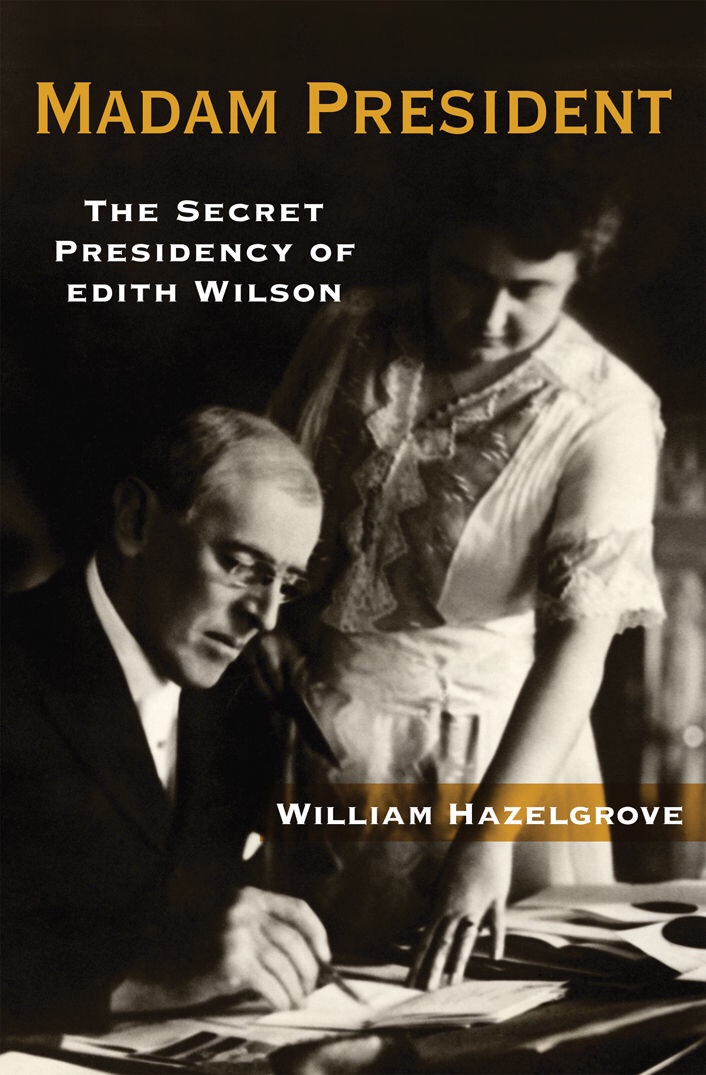 Madam President: The Secret Presidency of Edith Wilson by William Hazelgrove
Madam President: The Secret Presidency of Edith Wilson by William Hazelgrove
Edith Wilson is commonly recalled as the First Lady who was functionally president while her husband languished from a crippling stroke concealed from the nation. Her designs were not devious or even political. She primarily sought to protect her husband, whom she feared might die if forced to quit office early, especially with his cherished League of Nations dream still unrealized. During their courtship after the President became a widower he confidentially shared with her diplomatic communications to and from Imperial Germany as he sought to avoid war, Herself the widow of a wealthy Washington jeweler, she quickly became accustomed to managing affairs of state. Wilson’s cabinet and other officials were exasperated when she kept them from the incapacitated President, but she seems to have managed the terrible secret as well as anyone could have, selectively procuring her husband’s signature and counsel on the most urgent questions while forestalling the rest. From a temperate old Virginia Episcopal family, she admired her husband’s stubborn Presbyterian-inspired convictions but was herself more flexible. She implored him to compromise with the Senate on the Versailles Treaty, which he, his mind more intransigent than ever thanks to the stroke, refused. How different the 20th century may have been had her plea prevailed.
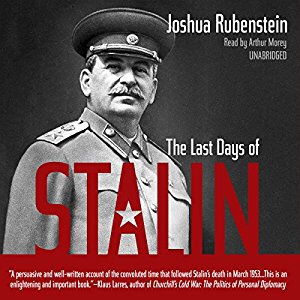 The Last Days of Stalin by Joshua Rubenstein
The Last Days of Stalin by Joshua Rubenstein
Stalin bent the Soviet Union and much of the world to his will through his murderous decisiveness and organized terror. His final days as an old man who had ruled and killed millions for more than a quarter century saw him even more paranoid and sociopathic. His Politburo and other underlings feared him too much to plot succession and feared him still even as he lay soaked in his own urine, near comatose and dying. Their fear perhaps hastened his death, as guards and staff delayed checking on the absent chieftain lest they provoke his wrath, then the Politburo and doctors feared to pursue any particular medical treatment lest they incur the consequences. Stalin’s final glance across the room as he breathed his last was recalled by his daughter as unspeakably malevolent, almost like a curse, as he entered eternity.
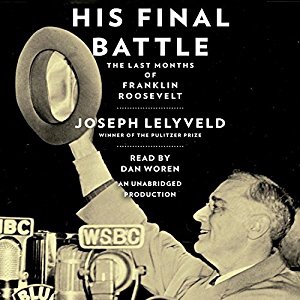 His Final Battle: The Last Months of Franklin Roosevelt by Joseph Lelyveld
His Final Battle: The Last Months of Franklin Roosevelt by Joseph Lelyveld
FDR’s final days contrast with his interlocutor Stalin, as the ailing President, despite his considerable weight loss and increasingly haggard look with palsied hands, sufficiently concealed his health collapse from the nation and perhaps even from himself as he won his final reelection and conducted WWII nearly to its successful conclusion. His rain drenched smiles and waves from an open convertible through chilly hours in New York’s streets in a campaign parade, interrupted only by a quick massage and change of clothes, demonstrated sufficient vigor to approving voters. Despite contrary critiques, he seems to have performed at Yalta with mental alacrity, not naive about the Soviets but believing the agreement was the best obtainable as the Red Army sweat into Eastern Europe. FDR struggled to regain health during a weeks’ long seclusion at Bernard Baruch’s baronial South Carolina estate, and later at his own rural Georgia cottage, where he died suddenly on a Spring afternoon surrounded by adoring friends and staff. Hitler would soon die in his bunker to the piercing explosive sounds of his capital city’s destruction above. Only days after worshipping on Easter Sunday at the local Episcopal church he built, FDR died amid the chirping of birds of the surrounding Georgia woods, knowing he had led his nation to its greatest military victory.
 The Gatekeeper: Missy LeHand, FDR, and the Untold Story of the Partnership That Defined a Presidency by Kathryn Smith
The Gatekeeper: Missy LeHand, FDR, and the Untold Story of the Partnership That Defined a Presidency by Kathryn Smith
Ironically, even ailing FDR outlived his younger, adoring longtime personal secretary Missy LeHand, who was incapacitated by a stroke before America entered WWII. She served and lived in close quarters with him for nearly twenty years, provoking rumors she was a mistress, but retaining the affection and appreciation of Eleanor Roosevelt, who was increasingly busy with her own expanding political portfolio. On the day of FDR’s nomination to the presidency LeHand joined him on a dramatically unprecedented plane ride to the Democratic Convention in Chicago, trying to type his speech as the little plane plummeted through turbulence. From her sick bed she phoned him on the day of Pearl Harbor but he was too busy to respond. She despaired over her distance from him and possibly expired from distress after seeing newsreels of his thin and slack jawed visage while accepting the 1944 Democratic nomination from a secret wartime locale. Her professional and emotional partnership was central to his remarkable political ascendancy after polio crippled him, making his success partly hers. The daughter of Catholic Irish immigrants, she comfortably integrated into the Roosevelts’ patrician WASP family and social life.
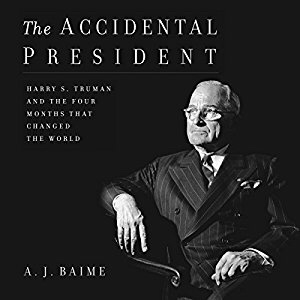 The Accidental President: Harry S. Truman and the Four Months That Changed the World by A.J. Baime
The Accidental President: Harry S. Truman and the Four Months That Changed the World by A.J. Baime
Upon his sudden accession to the presidency upon FDR’s death Truman asked reporters to pray for him as he felt the moon and the stars had all just collapsed upon him. Perhaps no president took power in more demanding times than Lincoln and FDR himself. But not even they had to preside over the conclusion of humanity’s greatest and most terrible war. Truman had to adjudicate surrender terms for Germany and Japan, confer with Stalin and Churchill at Potsdam, decide on the atom bomb’s deployment against Japan, and essentially conduct the first measures of the Cold War, all in his first four months. He wasn’t experienced in diplomacy but was decisive, sensible and politically savvy. More than the other challenges he seems to have most dreaded Potsdam, for which he felt most unprepared. In contrast, the book portrays his role in the atomic strikes as almost passive and deferring to long since decided military assumptions. He seems not to have been directly involved in the Nagasaki strike at all but did decree after it that there were to be no more atomic attacks. His dressing down of Molotov over Soviet behavior in Poland signaled WWII’s end would quickly transition into a new more protracted global confrontation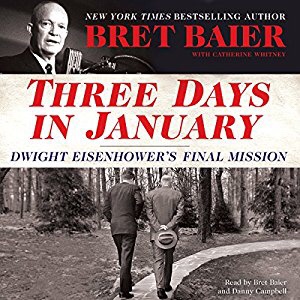 Three Days in January: Dwight Eisenhower’s Final Mission by Bret Baier
Three Days in January: Dwight Eisenhower’s Final Mission by Bret Baier
The Fox News broadcaster offers an insightful overview of Eisenhower’s motivations and preparation of his 1961 presidential farewell address, most famous for his warnings against the military industrial complex. His plea was part of Ike’s larger political architecture of equilibrium. As a soldier-statesman, he strove for moderation and national consensus, sustained by careful presidential statecraft that avoided soaring or polemical rhetoric. He sought an America without military equal, dominant in the world, but not hubristic or bellicose. Eisenhower was confident in the superiority of American democratic principles. But he was too sophisticated and worldly to believe in unlimited American virtue or capacities. He also had a deep if not always articulated Christian faith that protected him from excessive idealism and utopianism. Reinhold Niebuhr, composer of Christian Realism, was a Democrat who did not vote for Ike. But Eisenhower arguably better embodied Niebuhr’s perspective on the duties and limits of American power than did Adlai Stevenson or JFK.
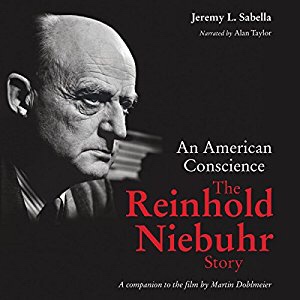 An American Conscience: The Reinhold Niebuhr Story by Jeremy Sabella
An American Conscience: The Reinhold Niebuhr Story by Jeremy Sabella
Here’s the companion volume to the recent short but concisely enjoyable documentary about the most influential American Protestant thinker of the last century. The book almost as much as the documentary is an ode to Niebuhr’s brilliance while admitting to some arguable faults, such as his less than robust support for the Civil Rights Movement. But Niebuhr’s essence was to warn against the soaring expectations of any human reform campaign, which thanks to human sin and frailty, is always destined to disappoint and even generate new corruptions. Niebuhr’s most fulsome campaign was against Protestant pacifism and isolationism in favor of USA entrance into WWII, which was the central moral challenge of his lifetime, and for which he merits endless gratitude and remembrance.
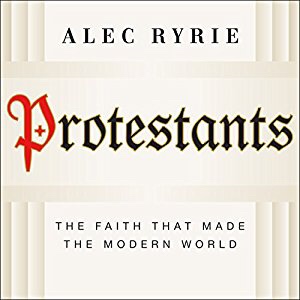 Protestants: The Faith That Made the Modern World by Alec Ryrie
Protestants: The Faith That Made the Modern World by Alec Ryrie
This sweeping overview of 500 years of Protestantism portrays the movement as endlessly chaotic and often on the seeming verge of collapse right before some of its greatest spiritual and demographic advances. Now globally including hundreds of millions, enlivened especially by Pentecostalism and dramatic growth in China, Africa and Latin America, Protestantism is fulfilling some of its stereotypes as engine of capitalism, democracy and egalitarianism, however haphazardly, and despite often contrary intentions. Politically empowered Brazilian and African evangelicals seem determined to create their own new version of Christendom. And Chinese Protestants often confidently stride forward as aspiring culture shapers, sometimes even as human rights advocates, undeterred by state persecution. Protestant stress on direct access to God inevitably has revolutionary implications, no matter the cultural context.
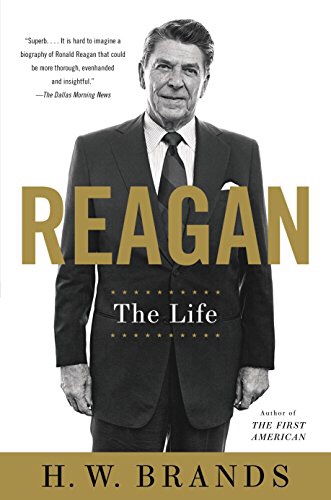 Reagan: The Life by H.W. Brands
Reagan: The Life by H.W. Brands
This book reports Reagan worried about the soul of his dying agnostic father-in-law but never took time to share his own faith before Nancy’s stepfather died. In fact, Nancy gave a speech at the end of her husband’s presidency to an evangelical gathering in which she recalled her husband had written a letter commending Christian faith to the dying man, who then summoned a hospital chaplain and died in peace. This omission is unfortunate but the biography overall commendably reviews the basic progression of Reagan’s political career and presidency, the latter of which I personally lived through and recall so vividly, making this book a special pleasure. Brands discerns that Reagan unlike some of his supporters and senior officials, like Defense Secretary Casper Weinberger, realized his early military buildup and economic recovery had created favorable circumstances for confident negotiations with Gorbachev. Like Eisenhower, and arguably in sync with Niebuhr, Reagan intuitively understood the breadth and limits of American power, and optimized the maximum moment without too many illusions.
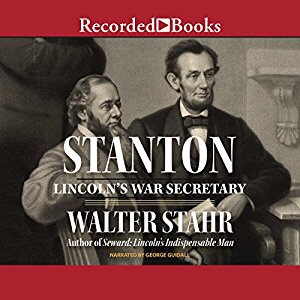 Stanton: Lincoln’s War Secretary by Walter Stahr
Stanton: Lincoln’s War Secretary by Walter Stahr
Arguably America’s greatest ever war minister, Stanton fiercely waged the struggle to save the Union in almost seamless collaboration with Lincoln, a fellow Midwestern lawyer who had more political skills than Stanton but not his mechanical ferocity. Stanton even more than Lincoln had a longstanding Christian faith and church involvement, starting with his Methodist childhood that evolved into steady commitment to the Episcopal Church. He knew the Bible well and likened Union war goals to the thoroughness of Joshua on Old Testament battlefields. Stanton had no experience in war strategy but he was a master organizer and administrator who understood the Union would prevail primarily through greater population, industry, wealth and superior transportation, all of which he mobilized in a grand and unprecedented national symphony that defeated the Confederacy and also drove him through exhaustion to an early death not long after the war. America forever should be grateful for his extraordinary labors.



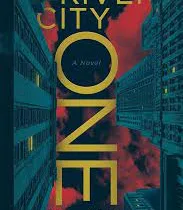
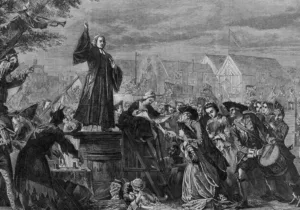
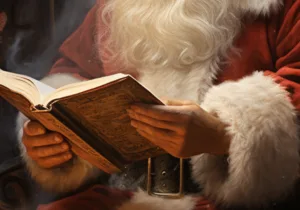

 Sponsor a student for Christianity & National Security 2024
Sponsor a student for Christianity & National Security 2024